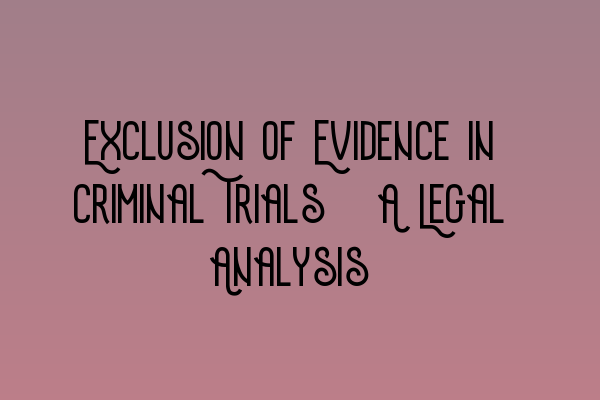Exclusion of Evidence in Criminal Trials: A Legal Analysis
Welcome to the latest blog post from SQE Criminal Law & Practice Law UK! Today, we will delve into the complex world of exclusion of evidence in criminal trials. Understanding this crucial aspect of the criminal justice system is essential for aspiring solicitors and legal professionals alike. So, let’s explore the intricacies of evidence exclusion and its significance in criminal trials.
The Importance of Evidence in Criminal Trials
Evidence forms the backbone of any criminal trial. It helps establish the truth and plays a pivotal role in determining the guilt or innocence of the accused. However, not all evidence is admissible in court. The exclusion of certain types of evidence ensures fairness, justice, and protects the rights of the accused.
Grounds for Exclusion of Evidence
Several grounds exist for excluding evidence from criminal trials. These grounds include:
- Illegally Obtained Evidence: Evidence obtained in violation of a suspect’s rights or due process is inadmissible. This includes evidence obtained through unlawful searches, coercive interrogations, or breaches of privacy.
- Hearsay: Hearsay evidence, which is an out-of-court statement offered for the truth of the matter asserted, is generally inadmissible unless it falls under an exception. The rationale behind this rule is to prevent unreliable and untested evidence from influencing the outcome of a trial.
- Unfair Prejudice: Evidence that may unfairly prejudice the jury against the accused can be excluded. This includes evidence of the accused’s prior bad acts or character traits that are irrelevant to the case at hand.
- Privilege: Certain types of evidence, such as lawyer-client communications or spousal communications, enjoy privilege and are protected from disclosure in court.
- Expert Opinion: Expert opinion evidence must meet specific criteria to be admissible. The court evaluates the expert’s qualifications, the reliability of the methodology used, and whether the evidence will assist the trier of fact.
For more information on the SQE exams, check out our SQE 1 Preparation Courses and SQE 2 Preparation Courses.
The Exclusionary Rule
In England and Wales, the exclusionary rule is not entrenched in the same way as it is in some other jurisdictions, such as the United States. However, the court has the discretionary power to exclude evidence if its admission would render the trial unfair or bring the administration of justice into disrepute.
When considering whether to exclude evidence, the court weighs the probative value of the evidence against any prejudicial effect it may have on the accused. This delicate balancing exercise ensures that relevant evidence is admitted while keeping the trial fair and just.
The Impact of Excluded Evidence
Exclusion of evidence can have a significant impact on the outcome of a criminal trial. Depending on the nature and significance of the evidence, its exclusion may weaken the prosecution’s case, create reasonable doubt, or even lead to the acquittal of the accused. Therefore, effectively arguing for the exclusion of certain evidence can be a crucial strategy for defending an accused person.
To enhance your understanding of criminal law and prepare for the SQE exams, practice mocks can be immensely helpful. Check out our SQE 1 Practice Mocks FLK1 FLK2 to test your knowledge and enhance your exam readiness.
Conclusion
In conclusion, the exclusion of evidence in criminal trials is a vital aspect of the legal system. It ensures fairness, protects the rights of the accused, and maintains the integrity of the criminal justice process. By understanding the grounds and implications of evidence exclusion, aspiring solicitors can effectively navigate the complexities of criminal trials and advocate for their clients with confidence.
For more information on SQE Criminal Law & Practice Law UK and upcoming events, stay tuned to our blog. Remember to also check out our SQE 1 Practice Exam Questions to further sharpen your legal knowledge.
